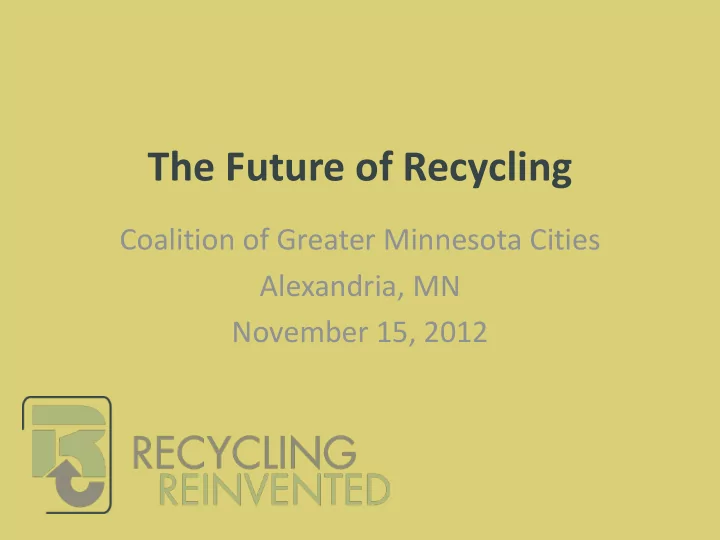

The Future of Recycling Coalition of Greater Minnesota Cities Alexandria, MN November 15, 2012
Topics • How are we doing in recycling? • Why we need to do more • What are the options? • How can we take some things off of your plate?
Recycling Reinvented • New 501(c)(3) nonprofit • Only purpose: Educate/advocate for EPR for packaging & printed paper • Staff includes two former state legislators with EPR experience
How are we doing? • Minnesota is above average • Counties responsible for recycling • Part of an integrated waste mgmt system • Solid waste management tax & SCORE grants are unique • Rural Minnesota does pretty darn well
What does recycling mean to MN? • MN markets in plastic, glass, steel, paper • MN recycling manufacturing jobs > 15,000 • Induced and indirect jobs > 22,000 • Material collected valued at $700 million, still threw away $285 million • $8.5 billion in gross economic activity • We conserve 5 million trees annually & take equivalent of 1.3 million cars off the road Source: MPCA
Source: As You Sow
What are international, national & regional trends in recycling? • Global brands committing to recycled content • Global demand for rigid packaging going up • But demand > supply (and has for a decade) • More automation, higher scale, big $$$ • Commodities traded globally
Source: As You Sow
What are the new challenges? • MPCA has goal of 60% recycling by 2030 • Cities have bigger worries than recycling • No new state or federal dollars likely • Taxpayers & ratepayers under strain
Options? • Some consumer brands are frustrated that they can’t get more material • They want to pay for the cost of recycling • They would like some control over how the money is spent and how recycling is organized • It’s called extended producer responsibility (EPR) • Similar to product stewardship
How does EPR work? TODAY UNDER EPR • Consumers pay hauler • Brand owners set up a or city for recycling producer responsibility service organization (PRO) • Enterprise fees, utility • PRO assumes cost of bill, general taxes recycling collection • Typical household cost • PRO allocates cost to = $30-40 per year brand owners • Consumer pays with new product
How it would work II • PRO would move toward more harmonization, scaling up of best practices • Would use existing infrastructure, especially when it is efficient • Would take until the end of decade to mature completely
What could EPR mean for you? • PRO reimburses public or private MRFs at negotiated rate —no “blank check” • Can’t charge for reimbursed services or services no longer provided • If a city doesn’t want it, it pays • Won’t void existing contracts
Stars & planets starting to align • Cities/counties seek relief • Retailers don’t want stuff in the store • Brands have set high recovery goals but don’t have a plan to meet them • Manufacturers need more material • Labor seeks stronger manufacturing
Next Steps • Seeking state legislation in 2013 or later • Developing a cost-benefit analysis • Targeting several states, including MN • Check out our white paper at www.recycling- reinvented.org/resources
Contact Info Paul Gardner Recycling Reinvented 612-227-4582 paul@recycling-reinvented.org
Recommend
More recommend